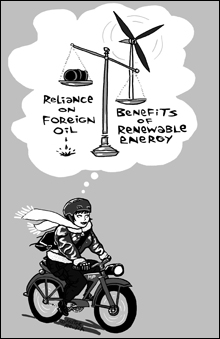
|
It’s a pretty rare day when lobbyists, environmentalists, and labor officials are all happy about supporting the same legislation — which happens to offer the prospect of economic development for fiscally challenged Rhode Island.
Yet this was the case on March 6, when the leadership of the state Senate unveiled four bills to increase the development and use of renewable forms of energy in Rhode Island. The broad support for the measures reflects the growing sense of possibility — far greater than it was even just two or three years ago — about the multi-faceted promise of tapping wind, solar, wave, and other renewables. As Matt Auten, an advocate for Environment Rhode Island, puts it, “There’s a real opportunity here. We can make a lot of change happen in the next couple of years.”
As if to underscore these words, Allco Renewable Energy on Tuesday announced plans for the first large-scale renewable energy project in Rhode Island.
At a hazardous waste site in Coventry, the New York-based company intends to create the largest solar farm east of the Mississippi, with the possibility of adding a wind farm at a later date.
In creating up to eight megawatts of electricity, enough to power a small town, the $45 million project will pay the town ($200,000 a year, or four percent of gross receipts, whichever is greater) and put a one-time Superfund site to a productive new use.
The fruition of the Allco Renewable project hinges on the passage of legislation, known as a feed-in tariff law, guaranteeing that the solar farm will be allowed to sell the energy it produces into the grid and for the company to be compensated by National Grid, the state’s dominant utility, at rates set by the state Public Utilities Commission.
Not so long ago, this concept might have seemed like pie in the sky. But at a time when Rhode Island remains mired in budget deficits, renewable energy is one key area in which bipartisan agreement is coinciding with the promise of economic development.
Equally importantly, National Grid has gotten on board, potentially providing the kind of market demand that is vital for a significant expansion of renewable energy. In January, following longstanding criticism from environmentalists, the utility dropped its opposition to entering into long-term contracts with producers of renewable energy.
RI’s renewable energy boomlet
Until now, the renewable approach in Rhode Island has been restricted to a few isolated efforts, like a wind turbine that was added a few years ago to reduce energy costs at the Portsmouth Abbey School. Similarly, it’s not particularly surprising that an environmentally attuned outfit, like the Southside Community Land Trust, a nonprofit in Providence, is partnering with People’s Power & Light to power its urban farm operation through renewable sources.
Now, however, in terms of other large-scale projects, Allco Renewable has proposed a wind farm that would involve hundreds of wind turbines off the coast of Block Island and Little Compton. An Australian firm, with state backing, has plans to create two wave-energy facilities. And state and labor officials are hopeful that a manufacturing facility for wind turbines, like those to be used at the Cape Wind project, could be established at Quonset Point.
Elsewhere around the state, Portsmouth, Barrington, Bristol, Warren, and James¬town are among the growing number of communities, Auten says, that are pursuing plans for a municipal wind turbine. The 1.5 megawatt project in Portsmouth, on the grounds of the high school, will be enough to power the school while also producing considerable excess energy.
Meanwhile, one of the bills under consideration at the State House would, through the concept known as net-metering, lower the utility costs of individuals who produce more energy than they consume, thereby offering an incentive for them to invest in solar panels or other renewable devices whose costs could otherwise prove prohibitive.
These days, with New Englanders reeling from their winter heating bills, and gas again selling for more than $3 a gallon, you don’t need to be an ardent environmentalist to appreciate the need for different approaches. There’s even some appealing poetry in how Rhode Island, which was left environmentally blighted by the bygone industrial revolution, is poised to reap economic benefits by going green.
A more muscular renewable sector won’t be a panacea for the state’s ongoing budget problems. Yet it could have a variety of beneficial effects, including the creation of thousands of good-paying jobs, diminished dependence on foreign oil, a stable and safe energy sources, and a positive impact on the environment.